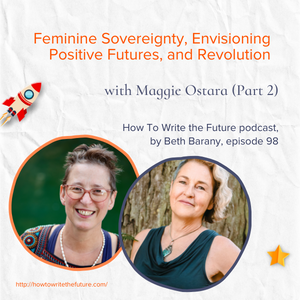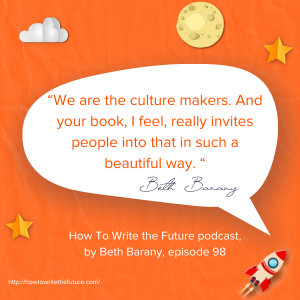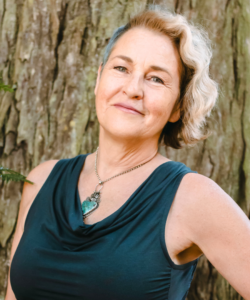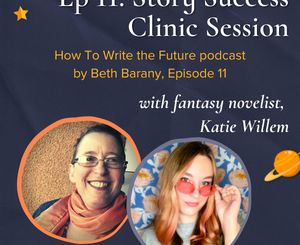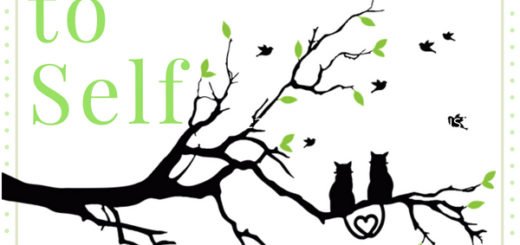Feminine Sovereignty, Envisioning Positive Futures, and Revolution with Maggie Ostara (part 2)
Feminine Sovereignty, Envisioning Positive Futures, and Revolution with Maggie Ostara (part 2) – How To Write the Future podcast, episode 98
“We are the culture makers. And your book, I feel, really invites people into that in such a beautiful way. “ – Beth Barany
In this episode of How To Write the Future, podcast host Beth Barany talks with Amazon bestselling author, Maggie Ostara about the concept of feminine sovereignty, the evolution of sovereignty, and about Thrutopia as a way to envision positive futures through reclaiming imagination. They discuss the importance of the writers’ roles in shaping revolutions and offer advice to science fiction and fantasy writers to keep creating and believing in the power of their work. (Storytelling to Share Complex Ideas with Maggie Ostara, part 2)
Platforms The podcast is available on Apple Podcasts| Buzzsprout | Spotify | Podcast Addict |Amazon Music | Youtube
RESOURCES for Feminine Sovereignty, Envisioning Positive Futures, and Revolution
Ensouling Language: On the Art of Nonfiction and the Writer’s Life by Stephen Harrod Buhner https://books2read.com/u/mdwWx5
Free World Building Workbook for Fiction Writers: https://writersfunzone.com/blog/world-building-resources/
Sign up for the 30-minute Story Success Clinic with Beth Barany: https://writersfunzone.com/blog/story-success-clinic/
Get support for your fiction writing by a novelist and writing teacher and coach. Schedule an exploratory call here and see if Beth can support you today: https://writersfunzone.com/blog/discovery-call/
About the How To Write the Future podcast
The *How To Write The Future* podcast is for science fiction and fantasy writers who want to write positive futures and successfully bring those stories out into the marketplace. Hosted by Beth Barany, science fiction novelist and creativity coach for writers. We cover tips for fiction writers. This podcast is for readers too if you’re at all curious about the future of humanity.
This podcast is for you if you have questions like:
– How do I create a believable world for my science fiction story?
– How do I figure out what’s not working if my story feels flat?
– How do I make my story more interesting and alive?
This podcast is for readers too if you’re at all curious about the future of humanity.
ABOUT MAGGIE OSTARA
Maggie Ostara, PhD left her prestigious job as the Director of Women’s and Gender Studies at Columbia University when she realized she’s not meant to work for anyone else.
She’s the author of the international Amazon best-seller, Feminine Sovereignty: 8 Pillars for Regenerating Ourselves and Our World (2023). In 2024 she’ll be offering the Feminine Sovereignty Explorers Club and the Feminine Sovereignty Leadership Incubator based in the principles of the 8 Pillars.
With over two decades of experience supporting 20,000+ students and hundreds of clients, Maggie teaches how to build your power within, make consistently reliable decisions, avoid overwhelm and burnout, create a bigger impact with less effort, and transform inner liabilities into powerful assets and allies.
She’s a certified Human Design and Quantum Human Design Specialist, Level 4, a certified Radiant Body Yoga Instructor, and a certified Clarity Breathwork Practitioner. She supports her global audience through her thriving YouTube channel and works with clients 1:1 and in groups.
Website: https://femininesovereigntybook.com/
What’s your Feminine Sovereign Archetypes? https://ostaraexperience.com/sovereignquiz/
FB: https://www.facebook.com/MaggieOstaraPhD/
IG: https://www.instagram.com/sovereigntybydesign/
Transcript for Feminine Sovereignty, Envisioning Positive Futures, and Revolution with Maggie Ostara (part 2)
BETH BARANY
Hey everyone, welcome to How to Write the Future. I’m Beth Barany, an award-winning science fiction and fantasy novelist and writing teacher, and coach, and I offer up this podcast as a gift to the world with tips for writers and anyone who cares about the future, because I believe that when we vision what is possible, we actually help make it so.
Enjoy part two where I talk with Maggie about her book, Feminine Sovereignty, Envisioning Positive Futures, and Revolution.
And something I would love for you to explain to our audience since it’s right there in the title: Sovereignty, I love how you explained it in the book. And of course, you don’t have to regurgitate that. But I think it’s a term that has many meanings.
And I think people need to hear from you. What does sovereignty mean? And why is your book called Feminine Sovereignty?
MAGGIE OSTARA
Yeah. So I first learned of the term “sovereignty” as applied to me or a person back in 1998, and it was in a shamanic journey that I was doing with somebody I worked with quite a bit, and she was talking to me about what claiming sovereignty of my being.
For people who do shamanic work, they work with entities, they work with stuff, all kinds of different things and nonphysical. So that’s what her orientation was, but I really picked it up and I was like, I like that word sovereignty. I like the quality of it. And I knew that because I’m a historicist and an Americanist, in my academic career, I really understood that what we think of as sovereignty changed really dramatically with the American Revolution because all of a sudden we went from sovereigns being kings, mostly kings, sometimes queens, but mostly kings to having a sovereign state, which then had sovereign citizens. So that’s a big historical change.
And what we got out of that was the sovereignty of individualism, which is the citizen of the new United States, which over time really became men of European descent, basically. And that they were empowered by this new state and, and most of us have really been very imprinted with this. I can do whatever I want as long as I don’t hurt another person. I have my autonomy. I have my agency. And it’s very individualistic, it’s individualism.
And, that individualism has been a huge contributor to the challenges we have in the living world. It’s just led us to think we could do anything we wanted. We could mine anything. We could cut down any forest. We could do anything to the oceans. We could do all of that. Humans are like the supreme being.
And we’re the sovereigns of the world and we can do whatever we want with it. It’s that kind of mentality.
So for me, when I was really working with sovereignty for years, a lot of it was about the inner landscape and building power within.
So that we are, we’re grounded. We’re physically healthy. We have command of our emotional energy. And then increasingly we know how to work with our, our energy and also our connection to spirit.
And then over time, I was like, yeah, but that’s necessary, but insufficient. Becoming sovereign of my own personal energy field and my own physical form, for example, is important. Like I need to understand these parts of myself. I need to know how to heal myself or grow myself, or whatever.
But then when I started having a bigger view, I was like, sovereignty, if you really think about the higher expression or the awakened expression of the sovereign. And you take it out of this idea of royalty, which is where all wealth accumulates to the royals, and the aristocracy and you go, but what do sovereigns really do?
Sovereigns are lawgivers. They’re the ones who help the tribe function. They’re the ones who help us understand who we are as a people. They’re the ones who maintain our values. They’re the ones who say, we are the people who are like this.
And they get their power as a sovereign from the people believing in them. It’s not from coercion. It’s not from violence. It’s not because you have armies. It’s not because of that. It’s because this person has a vision and, and, a caring and a compassion.
And so when I started really thinking about that, cause the truth is you can’t be a sovereign on your own.
You can be sovereign of your own field and there is a lot going on in here. So there is something about that, but you need other people to be a sovereign, right?
But then if we’re really looking at a Thrutopian vision of the future, right? We don’t want to reinstill either the sovereignty of individualism or the sovereignty of royalty. We want something new.
And that’s when I started thinking about feminine sovereignty, because I was like, what are the qualities of it?
So we’ve already proven that we’re the dominant species. Doesn’t mean we’re the most intelligent or the best or anything, but we’re the dominant predator, was like actually the way I like to say, we’re the dominant predator on the planet.
Okay. And we think that makes us better, but does it really?
No, it just means we’re better at killing things than other species are. And and so how do we evolve ourselves so that we become really the caretakers of our world?
Yes, we need power within. Yes, we need to be able to share and rotate power.
But how do we actually use our power as this dominant species to care for our living worlds and to take care of each other?
And this is the thing that indigenous people around the world know and it practiced forever. And they don’t see themselves as a dominant predator in relation to the living world. They see themselves as caretakers and stewards.
Evolve Into Sovereign Stewardship
MAGGIE OSTARA
And so this is what feminine sovereignty ultimately invites us to evolve ourselves into is to into sovereign stewardship, not for personal gain, but based in the recognition that we’re really all in this together. Yeah, and we have got to find a way to relate to and communicate and work with each other as human beings, but also with all the other species of the planet.
We have an enormous responsibility that we’ve been shirking, frankly, in my view. And so that’s what the sovereignty is.
There’s a power and a regalness and a radiance that comes with sovereignty that has to do with having really evolved ourselves into a higher state. And so that’s what the invitation of the book is about is how do we evolve ourselves into becoming those people that part of us already knows we need to be.
But culture doesn’t provide us with the ways to do that. Western culture doesn’t. And so we need to look elsewhere.
BETH BARANY
I would say that you and many others are writing the pathway. There’s the fiction. Those of us who are working on the fiction side. I feel like as a coach, I’m also writing in the nonfiction space around that.
And then your book, and others, Braiding Sweetgrass, everyone’s telling me to read. It’s on my shelf. Other book, Finding the Mother Tree, and so many other books out there. There are a lot of pathways that we have been putting out into the culture. So I feel like Western culture, we are changing it, right?
We are the culture makers. And your book, I feel, really invites people into that in such a beautiful way. I wanted to give a beautiful shout out. I love all the spirals everywhere in your book. And that’s my ogo that I’ve had for over 20 years. And I just feel like that level of that organic nature.
You’re really speaking to the organic nature that already exists. And also acknowledging how Western culture has been very linear, very boxed, as if things were, machines. We are very complicated. You could say we are complicated machines, but way more complex than anything we actually understand at this point.
About Thrutopia – Reclaiming our Imagination
BETH BARANY
I wanted to bring us back and talk about Thrutopia because I’ve mentioned it multiple times on the podcast, and I really want listeners to understand what Is Thrutopia. And you mentioned a little bit in the book, but maybe we can say again here, where the term came from and a little bit about Manda Scott, who ran the community that we met each other in.
And actually, I joined the class because of you, because I think Manda was interviewing you, or you were interviewing her. No, I think it was her podcast.
MAGGIE OSTARA
We interviewed each other
BETH BARANY
You interviewed each other on her Accidental Gods podcast, and I was like, oh my god, I have to take this class. I shared it with a friend. My friend signed up.
I signed up. It was such a wonderful class. Introduced me to people who are in the real world today doing things to change their communities, and have been doing them for the last 20 years or whatever. And I love that. I loved all those positive examples. It really fed me as a creative writer.
So yeah, can you define for us Thrutopia and its genesis and the kinds of stories that are coming out of that?
MAGGIE OSTARA
Yeah. Rupert Reed was the one who originally coined the term in an essay, and the reference for it is in my book. And, but you could just look up Rupert Reed Thrutopia and you’d find it.
And, he’s a, incredible visionary activist, very creative in what he’s doing. He’s in the UK. And he basically was saying, look, we have so many apocalypses happening right now, like we, we don’t need any more of those. We don’t need any more dystopias. Like so much creative energy has gone into the dystopias.
And the best that mainstream media can come up with is superheroes who are going to save us. Really? Come up with something else. So there’s the dystopia stuff. And then there’s the utopia stuff, which sometimes can be, I don’t know, interesting or enjoyable or entertaining or something, but I feel that often feel pretty ungrounded.
And it’s Okay, but my life is really different and I don’t know how to get from here to there, right?
I don’t want to go that, I don’t want to end up in a dystopia and I don’t know how to get to a utopia, so then what?
And so Thrutopia is the idea of the way personally I hold it is it’s about reclaiming our imagination.
It’s about reclaiming art, not allowing our imaginations to go on being colonized by the mainstream media entertainment industry, because it wants to do that, right? It says, Oh, I have to do all that imagining. We’ll just do it for you. Here’s your story, of the month or the week or whatever.
And so it’s like, how do we reclaim, and take sovereignty of our imagination?
And then use that to be like, huh, how could it go? It could go this way. It could be like that. This could happen. That could happen. And of course, this is what fiction writers do all the time, right? Is we’re using our imagination to be like, how could it go?
And how is this character going to act? And if you put this character and this character into this situation, what’s going to happen, right?
And so Thrutopias, it’s the same thing. It’s just with the intention of saying, Okay.
The way I think of it is pick something, some part of life that’s meaningful to you that you care about, so for one person that might be oceans or another person, it might be how small children are taken care of or whatever it is, something that you’re like, okay, this needs to evolve.
The way that we’re treating it. The way that we’re engaging with it is not working. It has to change. How can it change? I don’t know. Let’s see what we can come up with. And then you explore it . And, ideally, you want it to be believable. You want to be able to go, Oh yeah, you know what, that, that actually could happen. That could. If it’s too out there, then it’s, it becomes like the superhero thing, Although to me, like the best science fiction is also believable.
You don’t read it and go, Oh my God, that could never there could be aspects of it that are, that are so beyond anything we understand, but there’s still people in it, right? And it’s like, how do people operate in whatever environment you put them in? So it’s the same kind of thing.
And it challenges us to be like, okay, think outside the box. What can you come up with? And how can you make it believable? And to go back to what I was saying about my book is how do you do it in a way that keeps people engaged and makes them feel like they can participate in some way? So that’s how I think of is Thrutopia.
In Order To Write Thrutopia
MAGGIE OSTARA
So in order to write Thrutopia, it’s really helpful I think to be able to like, for me, my imagination opened up to be like, wow, I had no idea somebody could do that, whatever it is.
So she was really beneficial in that. And for those of you who are listening, she may be running another one in 2024. So if you’re interested, you could go check that out: Thrutopia dot life. And I know reading it really impacted, pillar seven and eight in my book, because there’s people who are in there that I learned about also stimulated me to go find other people who are doing stuff.
So I think to write a Thrutopian novel or vision, having that kind of understanding, because of course the mainstream media doesn’t cover any of this.
BETH BARANY
It’s basically positive stories of people making real impact and not just doom and gloom.
MAGGIE OSTARA
You just do the next thing. And then once you do that, you go, okay, what’s the thing after that? And after that, what’s the next thing after that? Pretty much everybody that I highlighted in my book and who we learned about through Thrutopia were like that. Like they started with a spark of something and then they just went, okay, what’s the next step? What’s the next step? And of course, you run into a dead end sometimes and then you make a turn or whatever, but yeah. and the thing about that’s really great is anybody can do it.
You just have to start where you are.
BETH BARANY
Yeah.
Yeah. I love that. Yeah, that’s step zero in My Writer’s Adventure Guide. Start from where you are.
MAGGIE OSTARA:
Exactly.
BETH BARANY
That’s great.
MAGGIE OSTARA
Because so many times people think about these big issues in our world today and they’re like, what can I do about climate change?
I’m like, you could plant a garden. They’re like, what difference is that going to make? I’m like, I don’t know, but why don’t you do it? And then see how you feel.
BETH BARANY
Yeah. Yeah. Maggie, I’m sure you and I could keep going. You have so many wonderful topics in your book.
I really want to encourage people to read it because we didn’t even cover what each of the eight pillars are, but I really want people to go and discover those on their own. So as we close, do you have any advice to science fiction and fantasy writers, people who want to write more positive futures into their stories?
Yeah. Do you have any advice for them?
Advice for Science Fiction and Fantasy Writers
MAGGIE OSTARA
Your work matters. Your work matters. You reclaiming your imagination is deeply significant. Revolutions are, evolutions are highly supported by the artists. Without the artists, revolutions don’t happen very well, right? Because you have to engage the imagination of people to believe that our lives could be different.
Because without that, you’re not gonna have any buy-in for your revolution. Right? Your ability to access and use your creativity and your imagination to create possibilities that other people haven’t thought about, but they can find they, they can find their way in it. They can be like, Ooh, I could, I can feel myself in there.
Don’t ever doubt how powerful your, the pen is the compute. No, the pen. I’m a big believer in the pen. Never doubt how powerful it is. And I know that it can be hard because you spend a lot of time alone in a room with a notepad or a computer or whatever. And you read your stuff over and you’re like, I don’t even know if that’s any good.
I know that part is not easy. But I just want to be an advocate for you to keep going, get together with others for support as you need to, get yourself a coach, hire Beth, whatever you need to do so that you can get the feedback. Like I said, like with my editor, I was like, tell me what’s working.
That’s what I need is I need to know what’s working. Get the support that you need for that, but also just build inside of yourself. You can even think about the writers who have really changed your life. How incredibly important that is and don’t ever believe this crap that people are saying nobody reads anymore.
It’s just not true. So don’t believe it. Your work matters.
BETH BARANY
Thank you, Maggie. I feel like you’re telling me directly. It’s so great. As someone who works on her book every day, I’m like, ah, yes, it matters. It matters.
MAGGIE OSTARA
It matters. It matters and it matters even if your book isn’t a bestseller. It matters, even if you’re, you’ve, you end up abandoning a manuscript at some point and move on to something else because every time energetically that you’re creating those new possibilities, they go out into the collective unconscious and they become available to other people.
So it matters.
BETH BARANY
Yeah, it matters. Absolutely. Thank you, Maggie. This has been really wonderful talking with you. I appreciate you and all your work that you’ve been putting out into the world for all these years. And I hope that people pick up your book, Feminine Sovereignty, and really take it to heart and enjoy the adventure that you invite them on.
MAGGIE OSTARA
Yeah. Thank you. And you can get the synopsis on the book’s website if you want to check it out before you buy it. It’s just feminine sovereignty book dot com and right at the top, it says download the synopsis. So I like to be able to have somebody be like, okay, is this actually something I want to read or not?
BETH BARANY
Yeah. Yeah. So everyone go to feminine sovereignty book dot com. Is that right? Great. All right. Thank you. Thank you so much, Maggie.
MAGGIE OSTARA
Yeah. Thank you, Beth. It’s delightful.
BETH BARANY
So that’s it for this week everyone. Please like, and subscribe, and share.
And I just really appreciate you for listening and for showing up for your creative work.
Write long and prosper.
Loved this episode? Leave us a review and rating here: https://www.buzzsprout.com/2012061
ABOUT BETH BARANY
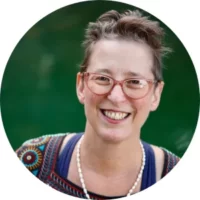
Beth Barany teaches science fiction and fantasy novelists how to write, edit, and publish their books as a coach, teacher, consultant, and developmental editor. She’s an award-winning fantasy and science fiction novelist and runs the podcast, “How To Write The Future.”
Learn more about Beth Barany at these sites:
Author site / Coaching site / School of Fiction / Writer’s Fun Zone blog
CONNECT
Contact Beth: https://writersfunzone.com/blog/podcast/#tve-jump-185b4422580
Email: beth@bethbarany.com
LinkedIn: https://www.linkedin.com/in/bethbarany/
IG: https://www.instagram.com/bethbarany/
TT: https://www.tiktok.com/@bethbarany/
FB: https://www.facebook.com/bethbarany
X: https://twitter.com/BethBarany
CREDITS
- EDITED WITH DESCRIPT: https://www.descript.com?lmref=_w1WCA (Refer-a-Friend link)
- MUSIC CREDITS : Music from Uppbeat (free for Creators!): https://uppbeat.io/t/soundroll/fuzz-buzz License code: UMMKDRL02DFGKJ0L. “Fuzz buzz” by Soundroll. Commercial license: https://musicvine.com/track/soundroll/fuzz-buzz.
- DISTRIBUTED BY BUZZSPROUT: https://www.buzzsprout.com/?referrer_id=1994465 (Refer-a-Friend link)
- SHOW PRODUCTION BY Beth Barany
- SHOW CO-PRODUCTION + NOTES by Kerry-Ann McDade
C 2024 BETH BARANY
For more “How To Write the Future” episodes, go here.
If you’d like to invite Beth onto your podcast, drop her a note here.

